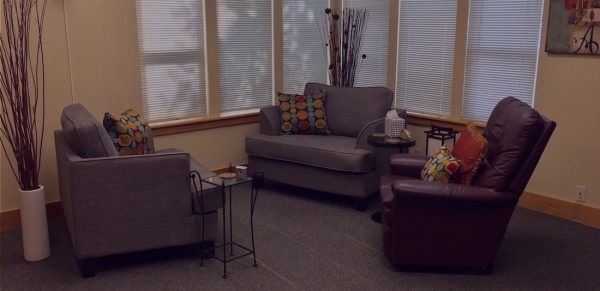My Approach
Therapy is a thought-provoking, significant experience that can serve as the foundation for a lifelong process of self-enlightenment. It provides a unique opportunity to increase your satisfaction with yourself, your relationships, and your career. In sessions, you gain skills you can build upon and use throughout your life.
Part of the healing process is sharing with other people who care.
~ Jerry Cantrell
In my 20 years of experience with counseling, I’ve witnessed improvement and recovery in patients who, as they move through each day, apply what they’ve learned in therapy. You, too, can discover the insight and tools you need to enact positive change in your life.

My goal is to provide a secure, congenial atmosphere so you can feel at ease in expressing your challenges and needs as you learn how to relieve anxiety, depression, or another life stressor. You can be assured I will conduct sessions with integrity, and what you share will be held in confidence.
My approach is collaborative; together, we’ll develop attainable goals, along with strategies that can help you achieve your desired changes. I am interactive in sessions, providing education and facilitating skill development. Based on your needs, I may introduce methods to help you change negative thoughts, decrease stress, improve social or communication skills, or more effectively solve problems as they arise.
If you sincerely want to gain greater life fulfillment or would like guidance overcoming depression, anxiety, problematic alcohol use, and life stressors, therapy can provide you with support and assist with solutions. Through a series of candid conversations, you’ll receive genuine, practical information that will support you in pursuing your goals. I will respectfully guide you to discover more effective ways of self-expression, so you can experience greater satisfaction in your life and pursue your full potential.
Ultimately, you can achieve a better understanding of yourself, greater self-acceptance, increased self-esteem, improved relationships, and more effective behavior and communication skills.
My Training and Treatment Philosophy
Systems Theory
I chose a Marriage and Family Therapy graduate program for its focus on Systems Theory, which has a more inclusive perspective of human behavior than other psychological theories. You’re a member of multiple systems, such as your family, workplace, and social group. This theory proposes that problematic thoughts, feelings, behavior patterns, and relationship functioning are most effectively understood within the context of the system in which they occur. Interactions in any system, and between systems, contribute to the experience of each member of that group. The theory focuses on strengths and uses communication, knowledge, and other tools to help you maintain a healthy balance in each system and improve your well-being overall.
With Systems Theory, if I’m going to understand your challenges in life, I have to consider the influence of your relationships. You are interconnected with your family members, friends, and business associates. When you change, you shift the balance in the overall system. Likewise, any change within a system affects you.

Taking this into account, I help prepare you to appropriately cope with others’ responses as you change. I suggest how you can help others better understand and support you. When appropriate and with your approval, I may suggest you invite significant others to attend some therapy sessions. You always have the choice of whether or not to include others.
Evidence-based practices
I use evidence-based practices, which have been shown to effect change, and am excited by the rapidly growing body of scientific evidence that supports my profession. Brain-imaging studies provide validation that certain therapy methods and complementary practices, such as yoga and meditation, change activity within the brain and can change the structure of the brain. For example, meditation increases activity in the part of the brain that elicits feelings of happiness. By drawing from these evidence-based practices, I can offer you an effective treatment approach that meets your needs.
Cognitive Behavioral Therapy
The basic premise of Cognitive Behavioral Therapy is that our emotions aren’t a direct result of situations, circumstances, or events, but instead result from our interpretations or perceptions. Cognitive therapy is focused on the present, is skill-based, and helps change beliefs that are problematic. Changing beliefs can lead to emotional relief and more effective behavior.
There is a large body of evidence supporting cognitive therapy’s effectiveness in treating depression, anxiety and substance use disorders. With these disorders, we often develop thought patterns that actually reinforce difficult or painful emotions and ineffective behavior. These patterns are referred to as cognitive distortions.
Cognitive Behavioral Therapy uses step-by-step exercises to methodically identify and examine thoughts for the presence of distorted patterns. You can then generate alternate thoughts that are typically more objective and realistic. As a result, you can experience greater overall well-being and feel equipped to make choices that truly serve you.
Mind-Body Practices, Mindfulness, and Hypnosis
I incorporate complementary practices when appropriate. Progressive muscle relaxation, guided imagery, hypnosis, mindfulness, and meditation are common methods effective for stress reduction and relaxation. These practices increase well-being of mind and body, so you can enjoy life more.
Therapeutic Relationship
The therapeutic relationship is one of the most important indicators for a positive therapy outcome. Just as trust in any relationship takes time to develop, so does trust between client and therapist. It takes courage to ask for help, and I have deep respect for you in this difficult moment. It can be awkward to divulge your deepest fears and challenges to a stranger, so I strive to create a comfortable, safe environment.

You can expect to have my undivided attention during our sessions. My phone will not ring, and there will be no interruptions to our time. I am attentive, interactive, and genuinely interested in what you have to say. I’ll give you feedback that allows you to know that I have empathy for your pain and an understanding of your challenge. To help you be an active participant in your healing, I provide education and resources, such as articles, websites, and apps.
As we work together, you can feel increasingly heard, accepted, and empowered to live the life you want.
Initial Contact
If you’re interested in learning more about my practice in Park City, UT, please call (435) 901-3218, or contact me to schedule an appointment. I am happy to discuss any questions you have about how therapy can address your needs, or about the methods I use, including Cognitive Behavioral Therapy and mindfulness.